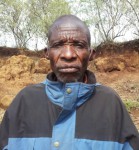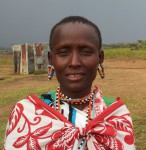 Ntimama Oloonturot is a Maasai homesteader is Kenya's Narok County. (Photo: Michael Kaloki)
Ntimama Oloonturot is a Maasai homesteader is Kenya's Narok County. (Photo: Michael Kaloki)
Give and forget.
This is how one elder describes the way of life that guides the Maasai of East Africa. He speaks not of giving and getting, but of giving and letting go.
The concept is called “osotua,” and its closest English translation would be “umbilical cord.”
It means if someone doesn’t have enough, you give—up to your ability, only as much as they need and without expecting anything in return.
Once you enter this osotua relationship, you and your partner are “isotuatin,” bound for life. So are your children’s children.
Ntimama Oloonturot lives in Narok County, Kenya. He says osotua was born out of more than just sympathy. It comes from necessity.
“In history the Maasai have suffered, seen drought, famine, wars,” he says. “So the generosity has cropped out of suffering. It becomes more like a preemptive measure. ‘Today I have, but I might lack tomorrow.’ Therefore you give today so that tomorrow when you don’t have, you’ll have somebody to give to you.”
Athena Aktipis is an evolutionary biologist and the Director of Human and Social Evolution at the Center for Evolution and Cancer at the University of California San Francisco.
She says the abandonment of a this-for-that, tit-for-tat system is vital in the tenuous environments that some Maasai still live in.
“There can be ecological shocks, not enough rainfall,” she says. “There can be theft. There can be disease that can wipe out a good portion of your stock. And this osotua system is a sharing system that enables individuals to ask for cattle if they are below the threshold for sustaining their families.”
Kitita ole Nkono, a Maasai elder in Narok County, is between 60 and 70 years old.
He once saw the very situation Aktipis speaks of. Two families lost their livestock and because ole Nkono’s herd was still intact, they came to him.
“It was my responsibility to give these families something to start up with,” he says. “And I shared with them goats, sheep and cows so that they could go and build their own small huts.”
He sees it like this. If you give someone some food, you don’t expect them to give it back. You expect them to eat it.
“You give it and they take it and it becomes part of them,” he says. “So you give it and forget. But it comes back in other ways you never know. So giving is like putting money in a bank, and you get dividends in ways you never know, but it’s there.”
Kinyikita Ene Tarakuei also lives in Narok County. She says the Maasai don’t believe in individuality.
“The reason for osotua is because the people know they can’t live on their own,” she says.
This group mentality is evident in the words of another elder, Maraa ole Parkesui. He belongs to the grandfather age group in Narok County.
“I am a prosperous old man, and I cannot say that it is because of my sweat that I live the kind of life that I do,” he says. “It is because people have helped me along the way.”
And Maraa ole Pakesui has helped other people. He says a young man who wanted to marry once asked him for help, because he couldn’t afford the required bride price. Maraa gave him one of his own daughters, and livestock to support the couple.
“I don’t think there’s anybody in this world who has never been helped,” he says.
A woman named Nalos Enole Lekutit, from the same area, says she is frequently in a position to help people. They’re not always friends, or even fellow Maasai. The Maasai tradition of generosity extends even to outsiders.
“Because I live on the roadside, strangers pass by and they walk into my house and ask me, ‘Give me food,’” she says. “And I don’t ask why, I just give them food because it is our culture to help people.”
Maraa ole Parkesui sums it up like this.
“You do not give so someone will help you in the future,” he says. “Give so they will help another person, and this creates a ripple effect so that nobody has to die because they don’t have one thing or the other. A community that does not help each other will die.”
With reporting help from Michael Kaloki in Narok County.






This is beautiful